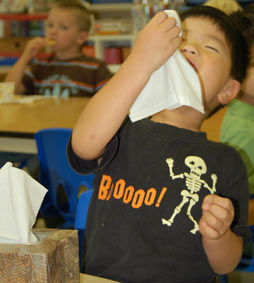By Season Weeter/reporter

Most people agree it is important for children to remain free of illness—especially when it comes to parents’ missing work or school due to fevers or other symptoms that pop up during flu season.
Parents, teachers, child care workers, bosses and doctors alike (well maybe not so much the doctors) don’t want to see children sick because of the effects on everyone involved from the transmutability of many illnesses.
Parents can probably relate to having one of their children come down with some sort of cold. Then a week later, another catches it and so on until the parent finally gets a more intense version of the cold after a month of nursing the rest of the family back to health.
Hygiene is obviously the number one preventive measure for illness control on a personal and community level. If it weren’t, people wouldn’t be taught from a young age to always wash their hands.
Dr. Neil S. Levy of Levy Pediatrics in Bedford said the most common illness for children during this time of year is upper respiratory infection. Levy, who has practiced medicine for 32 years, said URIs are a common diagnosis and in reality an umbrella. URI covers colds, allergies, stomach viruses and ear infections because all pose the same initial symptoms: runny nose, itchy eyes, sneezing, coughing and itchy throat.
Levy generally prescribes an antihistamine with a decongestant for patients diagnosed with a URI. He recommends Dimetapp, Triaminic or Loratadine with pseudoephedrine (Claritin) as over-the-counter remedies. Personally (as a parent whose youngest child is now 36), he said he suggests parents not use cough suppressants for coughs associated with URIs.

“ If treating kids at home,” he said, “be sure and call your pediatrician in two to three days if symptoms persist or worsen.”
As assistant director of Child Care for Churches in Bedford, Sharlene Benjamin has seen many illnesses on her job.
“ Most diseases [in the day care] are airborne,” she said.
Benjamin said common practices for prevention of spread of illness in the day care include keeping noses clean, washing hands and keeping children’s mats and sheets clean and separated from each other during storage at the facility. CCFC uses bleach and water solutions to disinfect all items in the facility daily.
MRSA infections are becoming a cause for concern among parents because of recent dramatic stories on television and the Internet describing events such as the 23 schools shut down in Kentucky for disinfection.
Locally, notices circulated to parents throughout school districts, such as Arlington, reported a few isolated cases here in the metroplex.
Staph infections are usually treated with antibiotics like penicillin, but some strains require a stronger one such as methicillin. Although the MRSA does not respond to penicillin or methicillin, the methicillin-resistant staph is still treatable.
Staph infections are highly contagious. Frequent hand washing is necessary to reduce risks of spreading any staph infection, according to the Centers for Disease Control and Prevention.
The best way to prevent the spread of staph is good personal hygiene for parents and their children.
“ Schools and day cares should be aware of open wounds and sores on children,” Levy said, “and check them routinely for signs of infection.”
Another health concern in Texas for parents is child obesity. Levy said roughly 15-30 percent of his patients are obese.
“ These couch potatoes aren’t eating right or getting enough exercise,” he said.
Levy said 95 percent of obesity in children is learned behavior arising from parents’ lack of knowledge of proper nutrition. If one parent is obese, the child has a 50 percent chance of being obese. If both parents are obese, the child has a 75 percent chance of becoming obese as an adult.
Obesity in children is attributed to poor diet (too much fast food or the “American diet” as Levy calls it), parents’ lack of information on proper nutrition, the environment and overall bad habits created at a young age.
Levy recommended starting good exercise and good eating habits early in life.
“ [Good habits] will stay with a child into adulthood,” he said. “Good diet and exercise are important for a child’s overall health, as well as prevention of illness and obesity.”
Vitamins are recommended in every child’s daily diet, preferably organic-sourced vitamins. Levy says to choose a health food store for consultation on finding the right vitamin for children. He said it is OK to consume a little more vitamin C during the cold season, but not to take too much since an excess of certain vitamins, like C, can cause more serious problems.
“ Use 100 percent fruit juice drinks—not juice cocktails,” he said.
Levy said parents should research proper nutrition and recommended the Web site http://www.mypyramid.gov/ for current recommendations by the Centers for Disease Control.
“ Parents should have five white meat days—pork, chicken, turkey and fish—and two red meat days—beef and ham—per week for healthy balance,” he said.
Since children develop their personalities in the first three years, Levy said parents should encourage healthy eating habits as well as exercise routines early in life. He said breastfeeding a baby for at least one year is best for diet, immune system and healthy brain development.
Healthy sleeping habits are important for overall health and keeping children well, Levy said. The biggest sign of inadequate sleep is irritability.
“ Hyperactivity can also occur if a child is not getting enough sleep,” he said.
A child’s sleep requirement varies individually. Pre-school children require 12–14 hours of sleep per day while school-aged children require less, eight–10 hours per day.
Levy said parents should not put a television in their children’s rooms and should get them outside.
“ [Limit children] to two hours of screen time per day,” he said. “A child needs plenty of playtime for proper physical and brain development. Regular attendance in sports activities outside of school as well as recess in school are necessary for good health.”




























